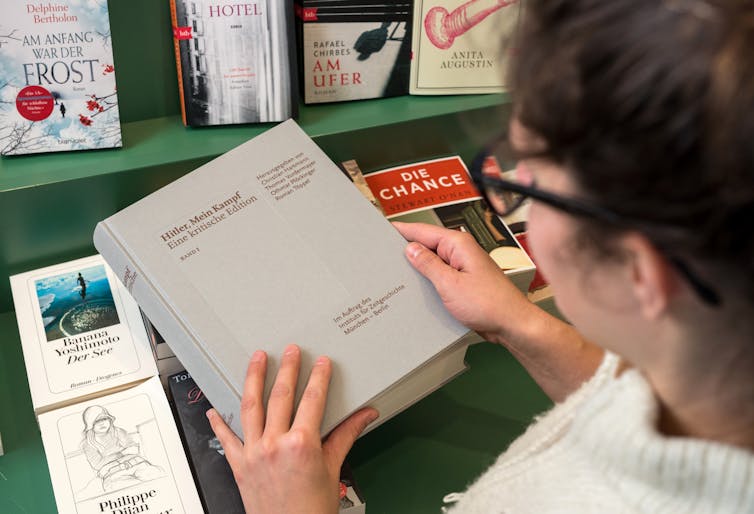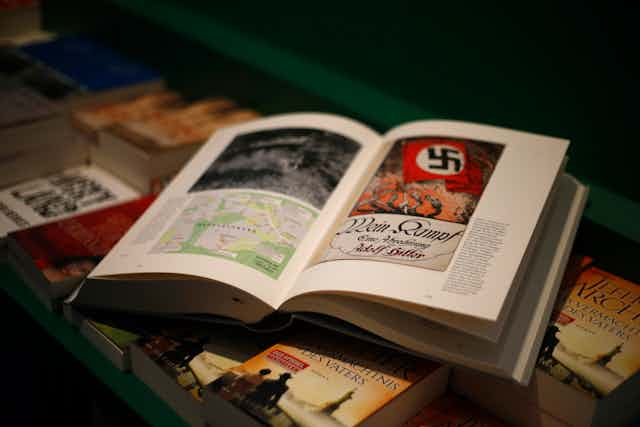Hitler’s infamous political memoir, Mein Kampf, continues to trouble us like few other texts in the world. Seven decades after the end of the Third Reich, it fascinates and appals in equal measure.
Available in many translations, Mein Kampf is widely read around the world and regularly features on bestseller lists in India. The state of Bavaria, however, used copyright legislation to ban any new German editions from being produced after 1945. All that came to an end though, when the copyright expired at the end of 2015. It is now legal to produce new copies of the book.
This has obviously caused some anxiety and, in an attempt to steer the way the German public engages with the text, the Institute for Contemporary History in Munich decided to launch a critical scholarly edition. It includes a long introduction and countless footnotes that point out the many flaws in Hitler’s arguments. As the editors have explained, their main aim was to foreground “what we can counterpose to Hitler’s innumerable assertions, lies and expressions of intent”.
The edition sold out before it even appeared on the shelves of bookstores. Many readers, including me, are still waiting for their copies. It seems that 15,000 advance orders were placed for a print run of just 4,000. The printers were overwhelmed and left unable to fulfil the requests of many frustrated customers.
It has also created a thriving black market. Copies are being traded at extortionate prices, well above the official €59.
Some worry that the Institute is inadvertently spreading Nazi propaganda. There is a real question as to whether those 15,000 advance orders could have come only from people with a historical interest in the text.
Others object to the overtly pedagogic approach taken by the editorial team that produced the new version. Are this group acting like a “nanny state”, using a tsunami of footnotes to control how the text is read today, rather than allowing readers to use their own judgement?
Not exactly a beach read
The moral taboo surrounding Mein Kampf is of course all about its author. Hitler was unique in writing a major political work before he came to power, and then continuing to issue that same work throughout the lifespan of the Third Reich.
As Hitler is now regarded as the very epitome of evil, his authorship suggests that Mein Kampf must also be the most evil book in the world.

But those looking for dangerous examples of Nazi ideas will find them in other places much more readily. The infamous speeches of Joseph Goebbels, rousing the masses to enthusiasm around the idea of “total war”, Leni Riefenstahl’s great propaganda movie Triumph of the Will, or the much reproduced anti-Semitic caricatures of Der Stuermer are all easily accessed and offer far more to worry about to people fearing the spread of extreme views.
The lengthy ramblings of Mein Kampf are unlikely to turn anyone into a modern-day fascist. The book was distributed in its millions under the Nazi regime, but there is little evidence that it worked as effective propaganda. It is, in fact, extremely hard to read.
It doesn’t present a particular political theory, either. Personal anecdotes are interwoven with observations on a vast array of different issues, from economics to architecture, from landscape aesthetics to history. There are certainly antisemitic rants, too, but what gives the text coherence, in so far as it has any, is a general mood music about a new style of politics of “intuition” and “character”, rather than theory and logical deduction. And indeed, much of it is not original Hitler. Whole passages are plagiarised or adapted from an array of earlier thinkers. Hitler’s skill was to synthesise, and to make these ideas and assumptions accessible.
Why the appeal?
The ideological context on which Hitler was drawing was familiar to many at the time. This contributed to the book’s apparent “commonsense” appeal, which in turn helped to mask some of Hitler’s more outlandish conclusions as apparently self-explanatory.
But this historical context has long faded, and a critical edition like that presented by the Munich editors can help explain these connections, that are so central to the book’s appeal. What this shows, however, is neither the nature of Nazi “propaganda” (this Hitler mostly left to his henchmen), nor what was unique about the regime (while racist ideas are sprinkled liberally throughout the book, there is no “blueprint” for the Holocaust in it).
What Mein Kampf does explain is precisely how ordinary, in many respects, National Socialism was at the time – and how that very ordinariness lured so many people into supporting a regime that committed the most extraordinary crimes.
A critical scholarly edition that explains that appeal would certainly be worthwhile. And it could serve as a warning against uncritical modern uses, where Mein Kampf has been treated as anything from an entertaining novel to a manual for management techniques in business.
At least some of the 15,000 people trying to get a copy of the new version may well be disappointed by what they find. I for one look forward to finally receiving mine and discovering what new light it casts on the “normality” of one of history’s most infamous dictators.

